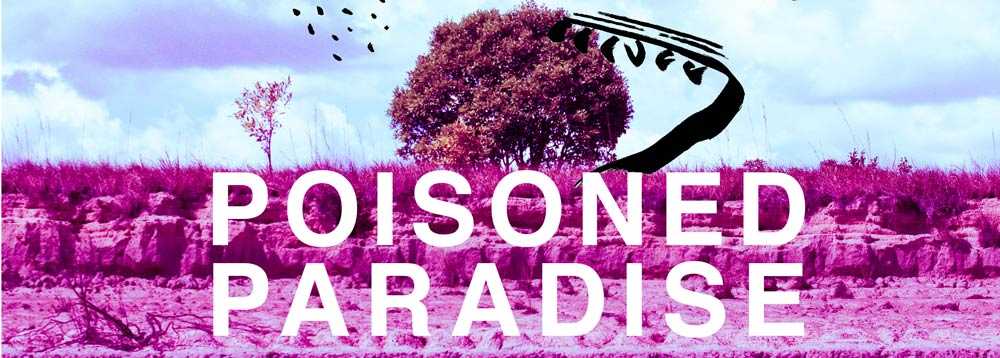
Poisoned Paradise (Pop-up Cinema Event)
Timezone:

In association with the Environmental Film Festival Planet On and its partner Connect4Climate, students from the MA International Film Business at the University of Exeter are in the final stages of organizing Poisoned Paradise, a pop-up cinema event featuring a diverse range of environmental documentary shorts that highlight the issues of pollution and waste around the world.
|
Towards a Climate-Smart World: 12 Ways for a Resilient Future
By
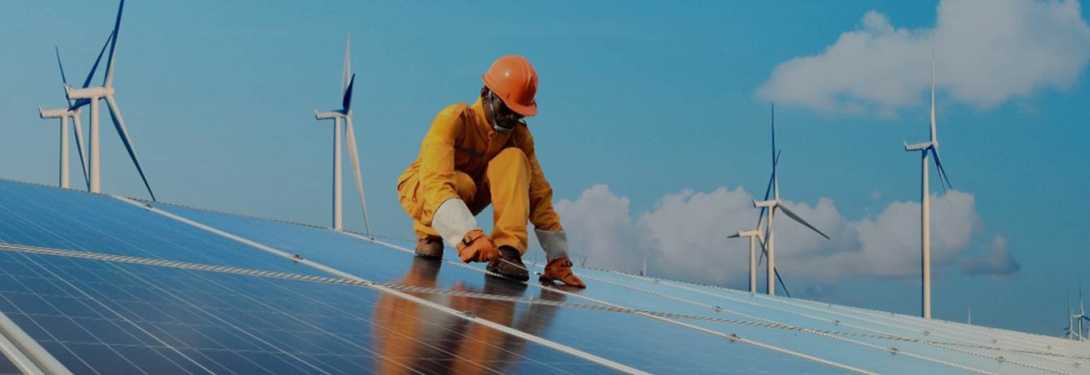
The ceiling of Rai Tabusoro’s home was ripped away by catastrophic winds. The 43-year-old was able to save the life of his elderly mother by placing her in a concrete bathroom, as well as a pregnant woman who he carried to shelter.
In the same Fijian village, Asmita Kamal, a 24-year-old teacher, found shelter under a table with her grandmother while her family hid under a bed as Cyclone Winston blasted through their village. Despite their best efforts to secure their house, strong winds swept away just about everything.
In early 2016, the Fiji province of Ra was hit by Cyclone Winston, the biggest storm ever recorded in the Southern Hemisphere, impacting 62% of the Fiji population and caused F$2 Billion in damage (20% of GDP). It killed 44 people, injured hundreds and left 131,000 people homeless. The Category 5 storm first made landfall in Ra, leaving its communities completely devastated.
Cyclone Winston was an example of new enemies facing communities. Enemies that are linked to climate change.
And 2017 was no better. It’s been a year of catastrophic climate events. Record-breaking hurricanes claimed lives and destroyed infrastructure across several island states in the Caribbean and in towns and major cities in the southern United States. Whenever extreme weather events like hurricanes and cyclones strike, they leave more than just a trail of devastation—they also leave communities further in the grip of poverty because poor people are more likely to live in fragile housing in disaster-prone areas, and work in sectors dangerously susceptible to extreme weather events, like farming and agriculture. In the end, the impact of a storm, flood, drought or earthquake is more than twice as significant for poor people than anyone else.

Taking action to reduce the carbon dioxide emissions that are causing climate change while also building resilience to more frequent and more extreme weather events, is now critical to development the world over.
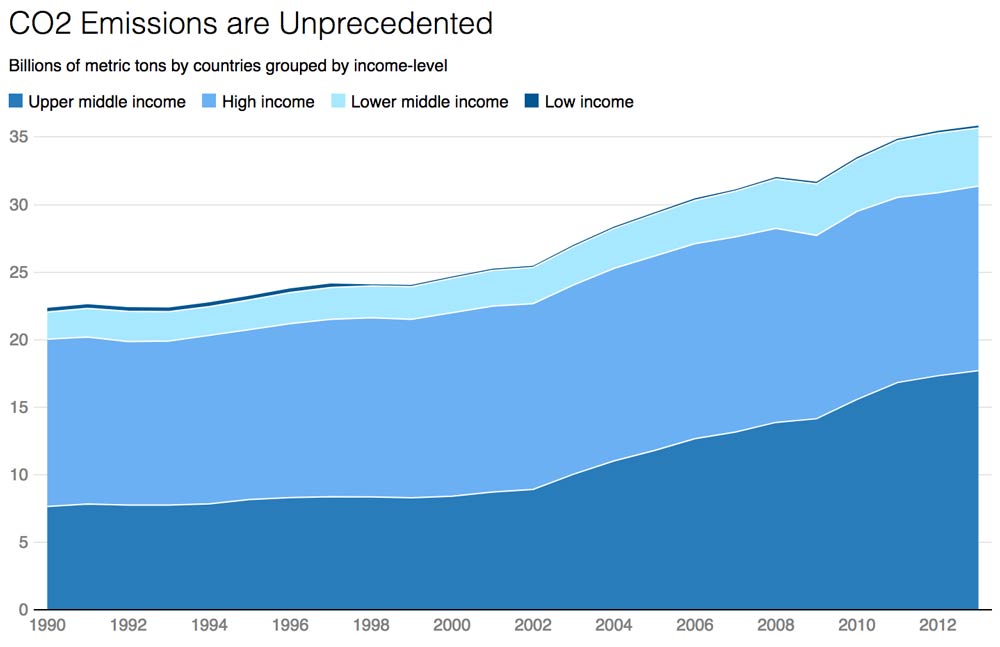
Source: World Development Indicators
|
12 Ways The World Bank Group is Supporting a Climate-Smart Transformation
By
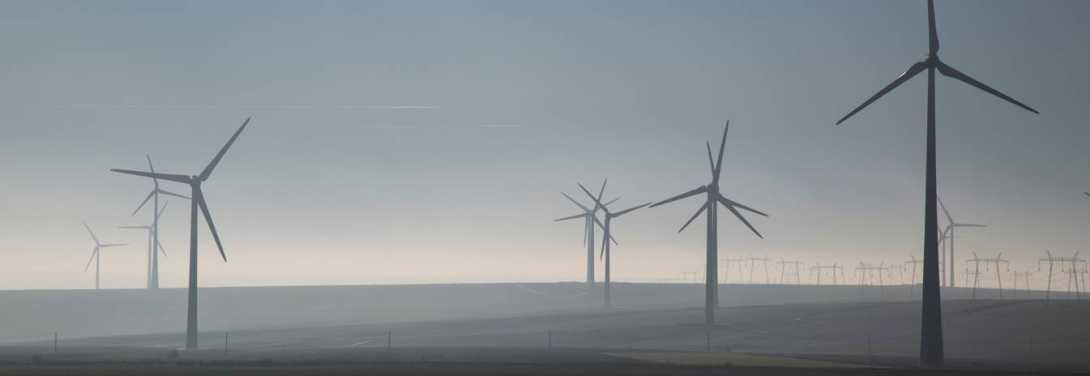
Since the Paris Agreement in 2015, the World Bank Group has been ramping up climate action and stepping up efforts to mobilize finance for climate action to help countries transition to a low-carbon, more resilient world.
December 12, 2017 marks the two-year anniversary of the Paris Agreement’s adoption. Leaders from around the world will gather in Paris to reaffirm the world’s commitment to the fight against climate change. Here are 12 ways we are working with our partners to help countries make the shift to a climate-smart world.
Banner and thumbnail photo credits to Jutta Benzenberg/World Bank
Laudato Si’ Challenge
Timezone:

A global initiative—an urgent call to action—encouraging startups to grow their breakthrough solutions to humanity's boldest challenges.
One Planet Summit
Timezone:
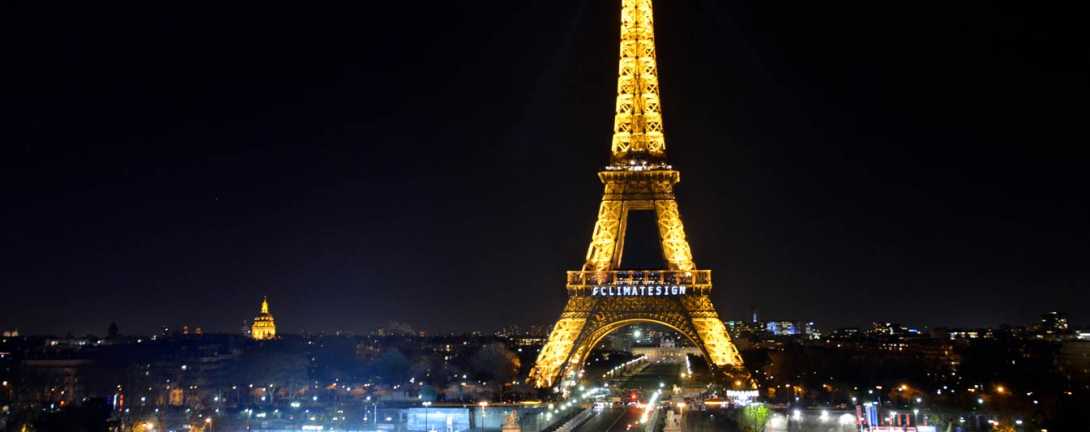
On 12 December 2017, the President of the French Republic, Emmanuel Macron, the President of the World Bank Group, Jim Yong Kim, and the Secretary-General of the United Nations, António Guterres, will address the ecological emergency for our planet by calling together in Paris international leaders and committed citizens from around the world.
For two years to the day after the historic Paris Agreement, it is time for concrete action.
|
Key Achievements from COP23
By
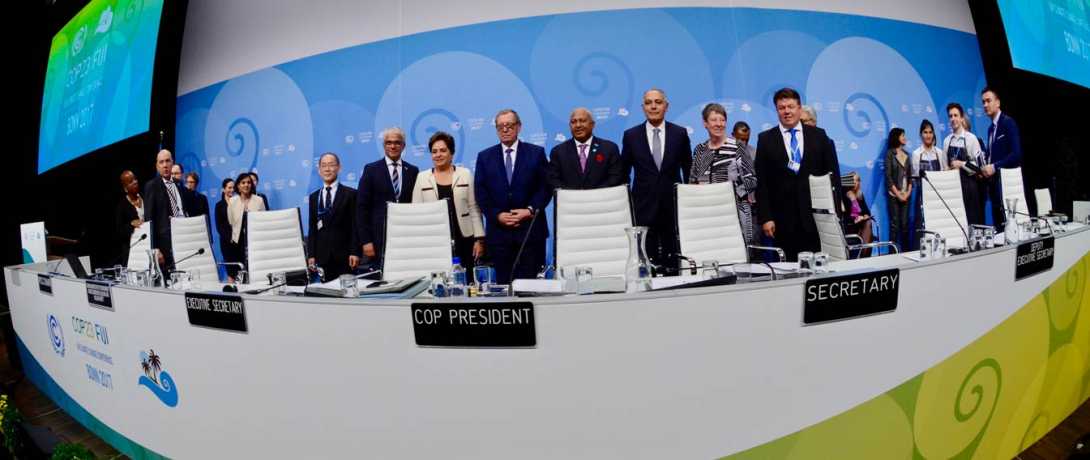
Bula vinaka!
We are pleased to say COP23 has been a success. Over the past two weeks, the global community has embraced Fiji’s concept of a Grand Coalition for greater ambition. In Bonn, the support for climate action from countries, regions, cities, civil society, the private sector and ordinary men and women was clearly on display.
Together, we have done the job we came here to do, which is to advance the implementation guidelines of the Paris Agreement and prepare for more ambitious action in the Talanoa Dialogue of 2018.
We brought our Fijian Bula Spirit to COP and it’s been wonderful how people responded. We want to warmly thank our hosts, the German Government and the UNFCCC, as well as the residents of Bonn.
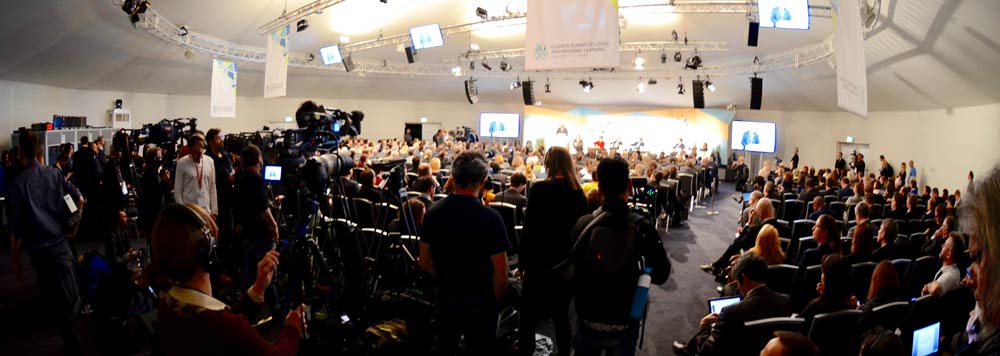
Photo Credit: Max Thabiso Edkins
Below, we are pleased to outline some of the key achievements from COP23.

 2018 Talanoa Dialogue: After extensive consultations, the Fijian COP23 Presidency announced an inclusive and participatory process that allows countries, as well as non-state actors, to share stories and showcase best practices in order to urgently raise ambition – including pre-2020 action – in nationally determined contributions (NDCs). This is ultimately to enable countries to collectively move closer to the more ambitious Paris Agreement goal of keeping the rise in global temperature to 1.5 degrees Celsius.
2018 Talanoa Dialogue: After extensive consultations, the Fijian COP23 Presidency announced an inclusive and participatory process that allows countries, as well as non-state actors, to share stories and showcase best practices in order to urgently raise ambition – including pre-2020 action – in nationally determined contributions (NDCs). This is ultimately to enable countries to collectively move closer to the more ambitious Paris Agreement goal of keeping the rise in global temperature to 1.5 degrees Celsius.
 Implementation Guidelines: While important work remains to be done, COP23 made significant progress toward clear and comprehensive implementation guidelines for the Paris Agreement, which will make the agreement operational. This is crucial to help governments plan their economies, and give confidence to investors and businesses that the low-carbon economy is here to stay. Countries will need to finalise the implementation guidelines at COP24 in Poland next year.
Implementation Guidelines: While important work remains to be done, COP23 made significant progress toward clear and comprehensive implementation guidelines for the Paris Agreement, which will make the agreement operational. This is crucial to help governments plan their economies, and give confidence to investors and businesses that the low-carbon economy is here to stay. Countries will need to finalise the implementation guidelines at COP24 in Poland next year.
 Launch of Ocean Pathway Partnership: The Fijian COP23 Presidency launched the Ocean Pathway Partnership to encourage the climate negotiations process to address the relationship between climate change and the ocean. In the true spirit of the Grand Coalition, the partnership will also consolidate existing work being done to create a coordinated effort among governments at all levels, existing ocean alliances and coalitions, civil society and the private sector to create a stronger link between climate action and a healthy ocean. The partnership will be co-chaired by Fiji and Sweden, who are joining forces again after leading the inaugural UN Ocean Conference in July.
Launch of Ocean Pathway Partnership: The Fijian COP23 Presidency launched the Ocean Pathway Partnership to encourage the climate negotiations process to address the relationship between climate change and the ocean. In the true spirit of the Grand Coalition, the partnership will also consolidate existing work being done to create a coordinated effort among governments at all levels, existing ocean alliances and coalitions, civil society and the private sector to create a stronger link between climate action and a healthy ocean. The partnership will be co-chaired by Fiji and Sweden, who are joining forces again after leading the inaugural UN Ocean Conference in July.
 Launch of InsuRelience Global Partnership: The German Federal Ministry for Economic Cooperation and Development (BMZ) contributed 110 million euros (US $125 million) to launch the InsuResilience Global Partnership for Climate and Disaster Risk Finance and Insurance Solutions to bring affordable insurance and other financial protection to millions of vulnerable people around the world. The contribution from BMZ follows a £30 million (US $39 million) commitment that was made by the Government of the United Kingdom in July.
Launch of InsuRelience Global Partnership: The German Federal Ministry for Economic Cooperation and Development (BMZ) contributed 110 million euros (US $125 million) to launch the InsuResilience Global Partnership for Climate and Disaster Risk Finance and Insurance Solutions to bring affordable insurance and other financial protection to millions of vulnerable people around the world. The contribution from BMZ follows a £30 million (US $39 million) commitment that was made by the Government of the United Kingdom in July.
 Launch of the Fiji Clearing House for Risk Transfer: This new online resource will help connect vulnerable countries with the best available information on affordable insurance and solutions – tailored to their unique circumstances – that will allow them to better prepare for the risks posed by climate change.
Launch of the Fiji Clearing House for Risk Transfer: This new online resource will help connect vulnerable countries with the best available information on affordable insurance and solutions – tailored to their unique circumstances – that will allow them to better prepare for the risks posed by climate change.
 Finalisation of the Gender Action Plan: Countries finalised the first-ever Gender Action Plan, which aims to increase the participation of women in all UNFCCC processes. It also seeks to increase awareness of and support for the development and effective implementation of gender-responsive climate policy at all levels of government.
Finalisation of the Gender Action Plan: Countries finalised the first-ever Gender Action Plan, which aims to increase the participation of women in all UNFCCC processes. It also seeks to increase awareness of and support for the development and effective implementation of gender-responsive climate policy at all levels of government.
 Finalisation of the Local Communities and Indigenous Peoples Platform: This platform will provide direct and comprehensive means to give a greater voice to indigenous people in the climate negotiations and allow them to share their traditional knowledge and best practices on reducing emissions, adapting to climate change and building resilience.
Finalisation of the Local Communities and Indigenous Peoples Platform: This platform will provide direct and comprehensive means to give a greater voice to indigenous people in the climate negotiations and allow them to share their traditional knowledge and best practices on reducing emissions, adapting to climate change and building resilience.
 Historic Breakthrough in Agriculture: Countries reached a historic agreement on agriculture that will help countries develop and implement new strategies for adaptation and mitigation within the sector, to both reduce emissions as well as build resilience to the effects of climate change. This was historic because it was the first time in the history of the climate negotiations that countries had reached an agreement on agriculture.
Historic Breakthrough in Agriculture: Countries reached a historic agreement on agriculture that will help countries develop and implement new strategies for adaptation and mitigation within the sector, to both reduce emissions as well as build resilience to the effects of climate change. This was historic because it was the first time in the history of the climate negotiations that countries had reached an agreement on agriculture.
 Adaptation Fund: The Adaptation Fund was replenished with a total of US $93.3 million, exceeding this year’s funding target by US $13 million. The Adaptation Fund has a track record of providing valuable resources to communities in developing countries for projects that help improve resilience to the effects of climate change. Projects may apply for funding to Adaptation Fund Board, which reviews applications through a transparent process. Countries also took the important next step to ensure that the Adaptation Fund shall serve the Paris Agreement.
Adaptation Fund: The Adaptation Fund was replenished with a total of US $93.3 million, exceeding this year’s funding target by US $13 million. The Adaptation Fund has a track record of providing valuable resources to communities in developing countries for projects that help improve resilience to the effects of climate change. Projects may apply for funding to Adaptation Fund Board, which reviews applications through a transparent process. Countries also took the important next step to ensure that the Adaptation Fund shall serve the Paris Agreement.
 America’s Pledge: A delegation of sub-national leaders led by Gov. Jerry Brown of California and former New York City Mayor Michael Bloomberg presented a report on the ongoing efforts by American states, cities, businesses and civil society to uphold the emissions reduction target of the United States under the Paris Agreement.
America’s Pledge: A delegation of sub-national leaders led by Gov. Jerry Brown of California and former New York City Mayor Michael Bloomberg presented a report on the ongoing efforts by American states, cities, businesses and civil society to uphold the emissions reduction target of the United States under the Paris Agreement.
 Bonn-Fiji Commitment: Local and regional leaders gathered to officially adopt the Bonn-Fiji Commitment of Local and Regional Leaders to Deliver the Paris Agreement at All Levels, a pledge that signals their commitment to bring forward a critical shift in global development. The Bonn-Fiji Commitment highlights the pledge to raise collective ambition for climate action.
Bonn-Fiji Commitment: Local and regional leaders gathered to officially adopt the Bonn-Fiji Commitment of Local and Regional Leaders to Deliver the Paris Agreement at All Levels, a pledge that signals their commitment to bring forward a critical shift in global development. The Bonn-Fiji Commitment highlights the pledge to raise collective ambition for climate action.
 Launch of the NDC Regional Hub: The NDC Partnership is establishing a new regional hub to support the implementation of NDCs in the Pacific. The Regional Pacific NDC Hub will be based in Suva, Fiji, and will provide expertise for developing regional solutions to mitigate global warming and enhance efforts by Pacific islands to adapt to climate change.
Launch of the NDC Regional Hub: The NDC Partnership is establishing a new regional hub to support the implementation of NDCs in the Pacific. The Regional Pacific NDC Hub will be based in Suva, Fiji, and will provide expertise for developing regional solutions to mitigate global warming and enhance efforts by Pacific islands to adapt to climate change.
 Health Initiative for the Vulnerable: The World Health Organisation, in collaboration with the UNFCCC and the Fijian COP23 Presidency launched a special initiative to protect people living in Small Island Developing States from the health impacts of climate change. Its goal by 2030 is to triple the levels of international financial support to climate and health in Small Island Developing States.
Health Initiative for the Vulnerable: The World Health Organisation, in collaboration with the UNFCCC and the Fijian COP23 Presidency launched a special initiative to protect people living in Small Island Developing States from the health impacts of climate change. Its goal by 2030 is to triple the levels of international financial support to climate and health in Small Island Developing States.
 First Open Dialogue between Governments and Non-Stare Actors: The Fijian COP23 Presidency presided over the first ever Open Dialogue between governments and non-state actors (including civil society, municipal governments and businesses) within the formal climate negotiations. Discussions were held surrounding two important topics. The first was how non-state actors can help countries design and implement more ambitious NDCs and the second was how to better integrate NPS into the climate negotiations process. Based on the success of the dialogue, there was strong enthusiasm to continue similar discussions at future COP meetings.
First Open Dialogue between Governments and Non-Stare Actors: The Fijian COP23 Presidency presided over the first ever Open Dialogue between governments and non-state actors (including civil society, municipal governments and businesses) within the formal climate negotiations. Discussions were held surrounding two important topics. The first was how non-state actors can help countries design and implement more ambitious NDCs and the second was how to better integrate NPS into the climate negotiations process. Based on the success of the dialogue, there was strong enthusiasm to continue similar discussions at future COP meetings.
 Expert Dialogue on Loss and Damage: Provides important space to raise awareness about the vulnerability of small island states. It will explore options for mobilising expertise, technology and support for the victims of climate change.
Expert Dialogue on Loss and Damage: Provides important space to raise awareness about the vulnerability of small island states. It will explore options for mobilising expertise, technology and support for the victims of climate change.For a complete list of announcements at COP23, please visit the UNFCCC’s website
|
Connect4Climate and Alphaomega awarded World's Best Sustainability Event with #All4TheGreen
By

The #All4TheGreen project, spearheaded by the World Bank Group's Connect4Climate and the Italian Ministry of Environment, Land and Sea, and organized by the agency, Alphaomega, has just won ‘World's Best Event for Sustainable Innovation, 2017’. Awarded by Bea World - International Festival of Events and Live Communication, the ceremony took place in Porto, Portugal, on November 20. The Italian project beat 296 other events from 27 countries.
#All4TheGreen was a set of public initiatives organized in collaboration with civic, cultural and academic organizations, environmental consortiums and associations, as well as dozens of companies to support the appeal for an economy that highlights efficiency saving and the re-use of resources. Open to all, #All4TheGreen week at the end of May 2017 in Bologna, Italy, featured more than 80 events - conferences, concerts, exhibitions, and film projections - to connect the G7 Environment Meetings being held under the auspices of the G7 Italian presidency to a global audience. As a result of the initiative, citizens had the chance to engage in environmental protection activities, generating debate, exchange of ideas and, above all, an aggregation of opinion and action.
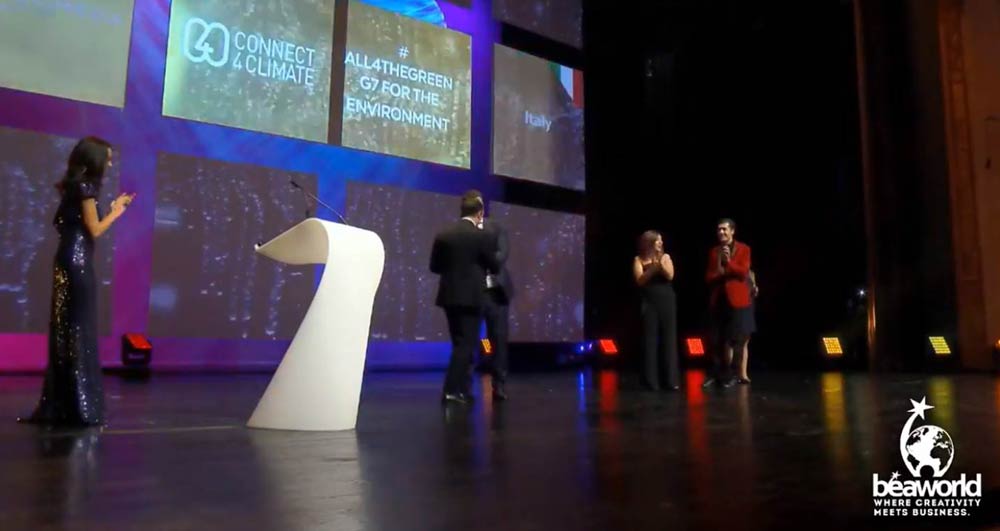
The prize is a significant recognition for the integrated communication agency founded 16 years ago in Rome by Alberto Cassone, Giovanni Cassone, and Enrico Conforti. Since then, Alphaomega has organized events, initiatives, and projects around the world for dozens of institutions and companies, and has more than 80 employees and consultants worldwide. The prize also recognizes Alphaomega's competence regarding sustainability.
The award is dedicated to the memory of Lucia Grenna, founder of the Connect4Climate program and soul of the All4TheGreen initiative, following her premature death in June. "On this occasion of deep satisfaction for our team, let us remember a unique woman who gave us her greatest support. A special thank you to Minister Gian Luca Galletti and his communication team," Alberto Cassone, partner of Alphaomega, said.
"Alphaomega expresses its utmost gratitude to the BEA World Festival 2017 jury for its presentation of a Festival that reviews the best creative proposals from around the world," he added.
BEA World - International Festival of Events and Live Communications is an international competition for communication agencies from Europe, Russia, the United States, Canada, China, the United Arab Emirates, and Qatar.
|
Bonn Climate Conference Becomes Launch-Pad for Higher Ambition
By

Momentum Builds With New Financial Commitments on Insurance and Forests to Scaled-Up Climate Action by Governments, Cities and Companies
Nations agreed today to launch the next steps towards higher climate action ambition before 2020 at the close of the annual UN climate conference held in the German city of Bonn.
Backed by a wide range of positive announcements from governments, cities, states, regions, companies and civil society, delegates from over 190 countries agreed to a 12-month engagement focusing on ‘Where are we, where do we want to go and how do we get there?’
The ‘Talanoa Dialogue’, inspired by the Pacific concept of constructive discussion, debate and story-telling, will set the stage in Poland in 2018 for the revising upwards of national climate action plans needed to put the world on track to meet pre-2020 ambition and the long-term goals of the two-year old Paris Agreement.
The Paris Agreement's central goal is keep the global average temperature rise below 2 Celsius and as close as possible to 1.5—the lower limit is deemed crucial for survival by many small islands and vulnerable countries.
Over one degree of this rise has already occurred since pre-industrial times. The current set of national climate action plans, known as NDCs, are still heading for a path towards 3 Celsius, possibly more.
Frank Bainimarama, President of the conference also known as ‘COP23’ and Prime Minister of Fiji, said:
“I’m very pleased that COP23 has been such a success, especially given the challenge to the multilateral consensus for decisive climate action. We have done the job we were given to do, which is to advance the implementation guidelines of the Paris Agreement and prepare for more ambitious action in the Talanoa Dialogue of 2018.”
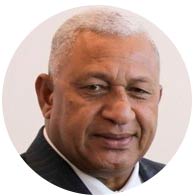
Frank Bainimarama, Fijian Prime Minister, COP23 President
“There has been positive momentum all around us. And Fiji is especially gratified how the global community has embraced our concept of a Grand Coalition for greater ambition linking national governments with states and cities, civil society, the private sector and ordinary men and women around the world,” he said.
“We leave Bonn having notched up some notable achievements, including our Ocean Pathway, the historic agreement on agriculture and others on a Gender Action Plan and Indigenous People’s Platform. We have also secured more funding for climate adaptation and launched a global partnership to provide millions of climate-vulnerable people the world over with affordable access to insurance.”
“I want to warmly thank our hosts, the German Government and the UNFCCC, as well as the residents of Bonn. We brought our Fijian Bula Spirit to COP and it’s been wonderful how people responded. Vinaka vakalevu. Let’s all leave rededicating ourselves to more ambitious action on climate change by moving Further, Faster, Together in the year ahead,” said Mr. Bainimarama.

 A report launched by the International Renewable Energy Agency during the conference has found that many countries now have higher renewable energy targets than are stated in their national climate action plans or NDCs – indicating that in some countries, at least in respect to green energy, higher ambition is already being locked in
A report launched by the International Renewable Energy Agency during the conference has found that many countries now have higher renewable energy targets than are stated in their national climate action plans or NDCs – indicating that in some countries, at least in respect to green energy, higher ambition is already being locked in
 A special scientific report, produced for the conference by Future Earth and the Earth League, says renewable energy expansion around the globe is doubling around every 5.5 years--consistent with the complete de-carbonization of the energy sector by mid-century
A special scientific report, produced for the conference by Future Earth and the Earth League, says renewable energy expansion around the globe is doubling around every 5.5 years--consistent with the complete de-carbonization of the energy sector by mid-centuryPatricia Espinosa, Executive Secretary of the UN Climate Change secretariat which hosted the conference with support from the Government of Germany, said: “COP23 in Bonn came against a backdrop of severe and unprecedented natural calamities that hit homes, families and economies in Asia, the Caribbean and the Americas – these reminded us of the urgency of our collective task.”

Patricia Espinosa, Executive Secretary of the UN Climate Change secretariat
“The conference has, with the adoption of the Talanoa Dialogue, delivered a launch-pad that can take us to that next stage of higher ambition. It has also advanced the implementation guidelines of the Paris Agreement so that by 2018 it can truly support sustained international cooperation and national efforts to realize a more secure, prosperous and better world for all,” she said.
“But Bonn 2017 did more than that – it underlined that support for the Paris Agreement is strong and that the journey upon which the world has embarked is an unstoppable movement supported by all sectors of society, across all parts of the globe.” said Ms Espinosa.
With so many climate action pledges and initiatives, a further strong message from all sides at COP23 was the growing need to coordinate efforts across policy, planning and investment to ensure that every cent invested and every minute of work contributed results in a much greater impact and boosts ambition under the national climate plans.
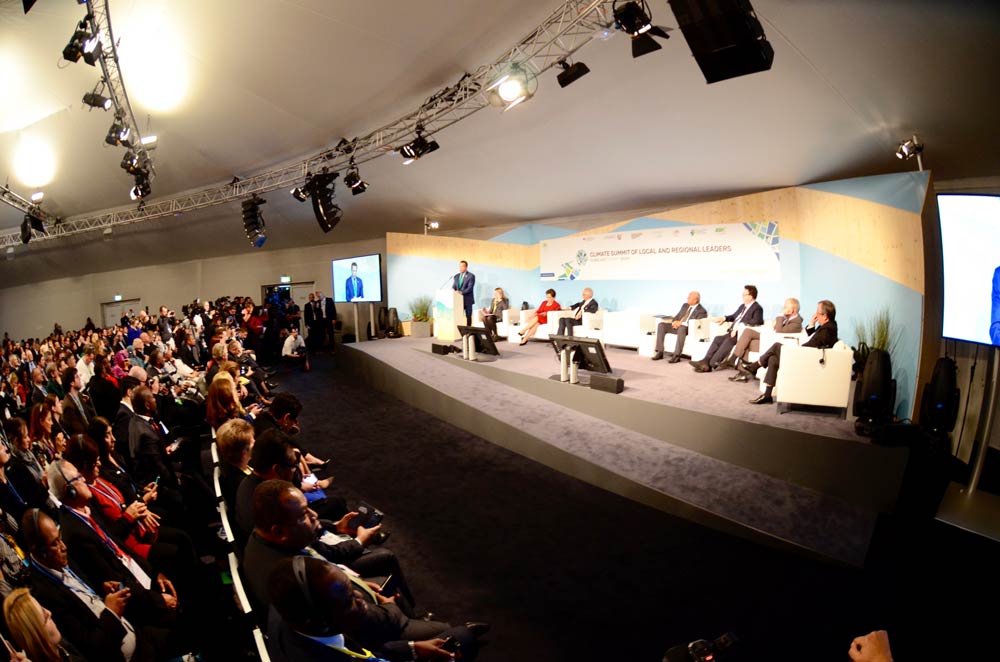
COP23 Uniting for Climate Action. Photo Credits: Max Thabiso Edkins/Connect4Climate
Outcomes and Highlights of the 2017 UN Climate Conference
The COP23 President and the UN Climate Change Executive Secretary outlined some highlights from the 2017 UN climate conference as a result of the negotiations; the Marrakech Partnership for Global Climate Action and the myriad of High-Level and other events.

 Long-term Finance – Countries welcomed progress but also urged greater efforts to deliver the agreed USD 100 Billion per year by 2020 for support to developing countries to take climate action
Long-term Finance – Countries welcomed progress but also urged greater efforts to deliver the agreed USD 100 Billion per year by 2020 for support to developing countries to take climate action
 Adaptation Fund Exceeds 2017 Target – The target for funding this year was $80 million, but funding announcements including by Germany and Italy has exceed this by over $13 million taking the total to $93.3 million
Adaptation Fund Exceeds 2017 Target – The target for funding this year was $80 million, but funding announcements including by Germany and Italy has exceed this by over $13 million taking the total to $93.3 million
 Historic Breakthrough in Agriculture – there was an historic political breakthrough in respect to agriculture that may lead to a faster and more coordinated response by nations to address a sector that is the second biggest emitter after energy
Historic Breakthrough in Agriculture – there was an historic political breakthrough in respect to agriculture that may lead to a faster and more coordinated response by nations to address a sector that is the second biggest emitter after energy
 The Government of Norway, the multinational company Unilever and other partners announced a $400 million fund to support more efficient agriculture, smallholder farmers and sustainable forest management
The Government of Norway, the multinational company Unilever and other partners announced a $400 million fund to support more efficient agriculture, smallholder farmers and sustainable forest management
 Gender Action Plan – The crucial role of women in combating climate change will be formally supported through the plan. This is important given that women tend to be especially vulnerable to climate change impacts and should not be excluded from decision-making regarding actions and solutions. The Plan aims to make women part of all climate change projects and decisions internationally and nationally
Gender Action Plan – The crucial role of women in combating climate change will be formally supported through the plan. This is important given that women tend to be especially vulnerable to climate change impacts and should not be excluded from decision-making regarding actions and solutions. The Plan aims to make women part of all climate change projects and decisions internationally and nationally
 Local Communities and Indigenous People’s Platform – A political and practical achievement that aims to support the full and equal role of indigenous people in climate action while recognizing the responsibility of governments to respect the rights of indigenous peoples in these decisions
Local Communities and Indigenous People’s Platform – A political and practical achievement that aims to support the full and equal role of indigenous people in climate action while recognizing the responsibility of governments to respect the rights of indigenous peoples in these decisions
 Launch of the Ocean Pathway Partnership – It aims, by 2020, to strengthen action and funding that links climate change action with healthy oceans including through the UN Climate Change process and via more explicit aims and ambitions in national climate action plans
Launch of the Ocean Pathway Partnership – It aims, by 2020, to strengthen action and funding that links climate change action with healthy oceans including through the UN Climate Change process and via more explicit aims and ambitions in national climate action plans
 Launch of Network of Pacific Island Journalists - Ten award-winning media from Fiji, Samoa; Solomon Islands; Papua New Guinea; Tonga and Vanuatu, attending the conference with funding from the Government of Germany and support from the Deutsche Welle Academy and UN Climate Change, announced the formation of a new association aimed at strengthening climate media reporting across the Pacific
Launch of Network of Pacific Island Journalists - Ten award-winning media from Fiji, Samoa; Solomon Islands; Papua New Guinea; Tonga and Vanuatu, attending the conference with funding from the Government of Germany and support from the Deutsche Welle Academy and UN Climate Change, announced the formation of a new association aimed at strengthening climate media reporting across the Pacific
 InsuResilience Initiative announced a new Global Partnership and an additional $125 million from the Government of Germany to support its aim of providing affordable cover to 400 more million poor and vulnerable people by 2020
InsuResilience Initiative announced a new Global Partnership and an additional $125 million from the Government of Germany to support its aim of providing affordable cover to 400 more million poor and vulnerable people by 2020
 Launch of Fiji Clearing House for Risk Transfer – A new online platform using artificial intelligence to help vulnerable countries find affordable insurance and solutions to avoid climate risk.
Launch of Fiji Clearing House for Risk Transfer – A new online platform using artificial intelligence to help vulnerable countries find affordable insurance and solutions to avoid climate risk.
 The governments of Germany and the United Kingdom along with other partners announced $153 million to expand programs to fight climate change and deforestation in the Amazon
The governments of Germany and the United Kingdom along with other partners announced $153 million to expand programs to fight climate change and deforestation in the Amazon
 The European Investment Bank formally announced $75 million for a new $405 million investment programme by the Water Authority of Fiji to strengthen resilience of water distribution and wastewater treatment for close to 300,000 people living in and around the capital Suva.
The European Investment Bank formally announced $75 million for a new $405 million investment programme by the Water Authority of Fiji to strengthen resilience of water distribution and wastewater treatment for close to 300,000 people living in and around the capital Suva.
 America’s Pledge brings together private and public sector leaders to ensure the US remains a global leader in reducing emissions and delivers the country’s climate goals under the Paris Agreement
America’s Pledge brings together private and public sector leaders to ensure the US remains a global leader in reducing emissions and delivers the country’s climate goals under the Paris Agreement
 The Green Climate Fund and the European Bank for Reconstruction and Development announced over $37 million of GCF grant financing to the $243 million Saïss Water Conservation Project to assist Morocco with more resilient agriculture
The Green Climate Fund and the European Bank for Reconstruction and Development announced over $37 million of GCF grant financing to the $243 million Saïss Water Conservation Project to assist Morocco with more resilient agriculture
 Powering Past Coal Alliance brings together 25 countries, states and regions to accelerate the rapid phase-out of coal and support affected workers and communities to make the transition.
Powering Past Coal Alliance brings together 25 countries, states and regions to accelerate the rapid phase-out of coal and support affected workers and communities to make the transition.
 The UN Development Programe, Germany, Spain and EU launched a EUR 42 million NDC Support Programme to assist countries deliver on the Paris Agreement
The UN Development Programe, Germany, Spain and EU launched a EUR 42 million NDC Support Programme to assist countries deliver on the Paris Agreement
 The existing NDC Partnership announced the establishment of a new regional hub to support implementation of national climate action plans or NDCs in the Pacific
The existing NDC Partnership announced the establishment of a new regional hub to support implementation of national climate action plans or NDCs in the Pacific
 13 countries and the International Energy Agency announced EUR 30 million to the “IEA Clean Energy Transitions Programme” to support clean energy transitions around the world
13 countries and the International Energy Agency announced EUR 30 million to the “IEA Clean Energy Transitions Programme” to support clean energy transitions around the world
 Launch of New Small Island Developing State (SIDS) Health initiative – The World Health Organization, in collaboration with the UN Climate Change secretariat and Fijian COP23 Presidency, announced a special initiative to protect people living in SIDS from the health impacts of climate change. Its goal is, by 2030, to triple the levels of international financial support to climate and health in those countries
Launch of New Small Island Developing State (SIDS) Health initiative – The World Health Organization, in collaboration with the UN Climate Change secretariat and Fijian COP23 Presidency, announced a special initiative to protect people living in SIDS from the health impacts of climate change. Its goal is, by 2030, to triple the levels of international financial support to climate and health in those countries
 The Bonn-Fiji Commitment was made - a commitment to action adopted by over 300 local and regional leaders to deliver the Paris Agreement at all levels, supported with 20 initiatives including those focusing on Africa, islands, post-industrial cities and climate reporting standards.
The Bonn-Fiji Commitment was made - a commitment to action adopted by over 300 local and regional leaders to deliver the Paris Agreement at all levels, supported with 20 initiatives including those focusing on Africa, islands, post-industrial cities and climate reporting standards. Banner and thumbnail photo credits to Max Thabiso Edkins/Connect4Climate
|
Concrete Climate Action Commitments at COP23
By
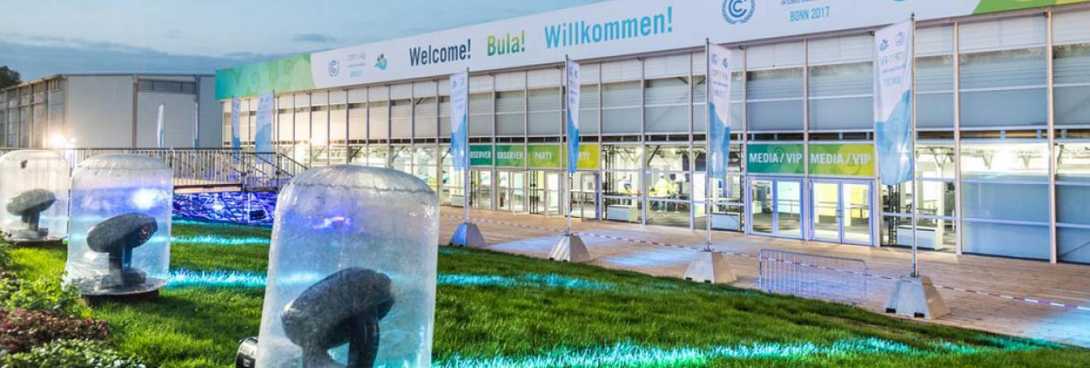
As the UN Climate Change Conference comes down to the last day and governments work to complete the final negotiation decisions, it’s good to be reminded of the new wave of climate action that has been announced during COP23 from countries, cities, states, regions, business and civil society.
The common message from all sides at this conference has been that action to get on track towards the objectives of the Paris Climate Change Agreement and to ultimately achieve the 2030 Agenda Sustainable Development Goals is urgent, time is really running out and everyone simply must do much better together to drive climate action further and faster ahead now.
Video also available on Vimeo
Above all, this means rapidly raising the current global ambition to act on climate change that is captured in the full set of national climate action plans (NDCs) which sit at the heart of the Agreement.
The following list includes announcements made during COP23 to drive us further, faster and together to this destination.
Financing Climate Action
Major announcements included funds to support the poorest and most vulnerable, whose plight has been brought into sharp perspective by this year’s extreme weather

 InsuResilience Initiative additional USD 125 mln from Germany to support provision of insurance to 400 more million poor and vulnerable people by 2020. A G20 and V20 (vulnerable nations) partnership
InsuResilience Initiative additional USD 125 mln from Germany to support provision of insurance to 400 more million poor and vulnerable people by 2020. A G20 and V20 (vulnerable nations) partnership
 Adaptation Fund exceeds 2017 Target – Germany’s contribution of 50 million euros and Italy’s contribution of 7 million euros means the Fund has now surpassed its 2017 target by over USD 13 million and stands at a total equivalent of USD 93.3 million dollars
Adaptation Fund exceeds 2017 Target – Germany’s contribution of 50 million euros and Italy’s contribution of 7 million euros means the Fund has now surpassed its 2017 target by over USD 13 million and stands at a total equivalent of USD 93.3 million dollars
 Norway & Unilever USD 400 mln fund for public and private investment in more resilient socioeconomic development. Investing in business models that combine investments in high productivity agriculture, smallholder inclusion and forest protection
Norway & Unilever USD 400 mln fund for public and private investment in more resilient socioeconomic development. Investing in business models that combine investments in high productivity agriculture, smallholder inclusion and forest protection
 Germany and Britain to provide combined USD 153 mln to expand programs to fight climate change and deforestation in Amazon rainforest
Germany and Britain to provide combined USD 153 mln to expand programs to fight climate change and deforestation in Amazon rainforest
 European Investment Bank will provide USD 75 million for a new USD 405 million investment programme by the Water Authority of Fiji. The scheme will strengthen resilience of water distribution and wastewater treatment following Cyclone Winston, the world’s second strongest storm ever recorded, which hit Fiji in February 2016
European Investment Bank will provide USD 75 million for a new USD 405 million investment programme by the Water Authority of Fiji. The scheme will strengthen resilience of water distribution and wastewater treatment following Cyclone Winston, the world’s second strongest storm ever recorded, which hit Fiji in February 2016
 Green Climate Fund and the European Bank for Reconstruction and Development signed up to free USD 37.6 million of GCF grant financing in the USD 243.1 million Saïss Water Conservation Project to make Moroccan agriculture more resilient
Green Climate Fund and the European Bank for Reconstruction and Development signed up to free USD 37.6 million of GCF grant financing in the USD 243.1 million Saïss Water Conservation Project to make Moroccan agriculture more resilient
 World Resources Institute announced a landmark USD2.1 billion of private investment earmarked to restore degraded lands in Latin America and the Caribbean through Initiative 20x20
World Resources Institute announced a landmark USD2.1 billion of private investment earmarked to restore degraded lands in Latin America and the Caribbean through Initiative 20x20
 UNDP, Germany, Spain and EU launch EUR 42 million programme NDC Support Programme at UN Climate Summit to help countries deliver on the Paris Agreement
UNDP, Germany, Spain and EU launch EUR 42 million programme NDC Support Programme at UN Climate Summit to help countries deliver on the Paris Agreement
 NDC Partnership to establish a new regional hub to support implementation of Nationally Determined Contributions (NDCs) in the Pacific
NDC Partnership to establish a new regional hub to support implementation of Nationally Determined Contributions (NDCs) in the Pacific
 13 countries and IEA - EUR 30 mln to “IEA Clean Energy Transitions Programme” to support clean energy transitions around the world
13 countries and IEA - EUR 30 mln to “IEA Clean Energy Transitions Programme” to support clean energy transitions around the world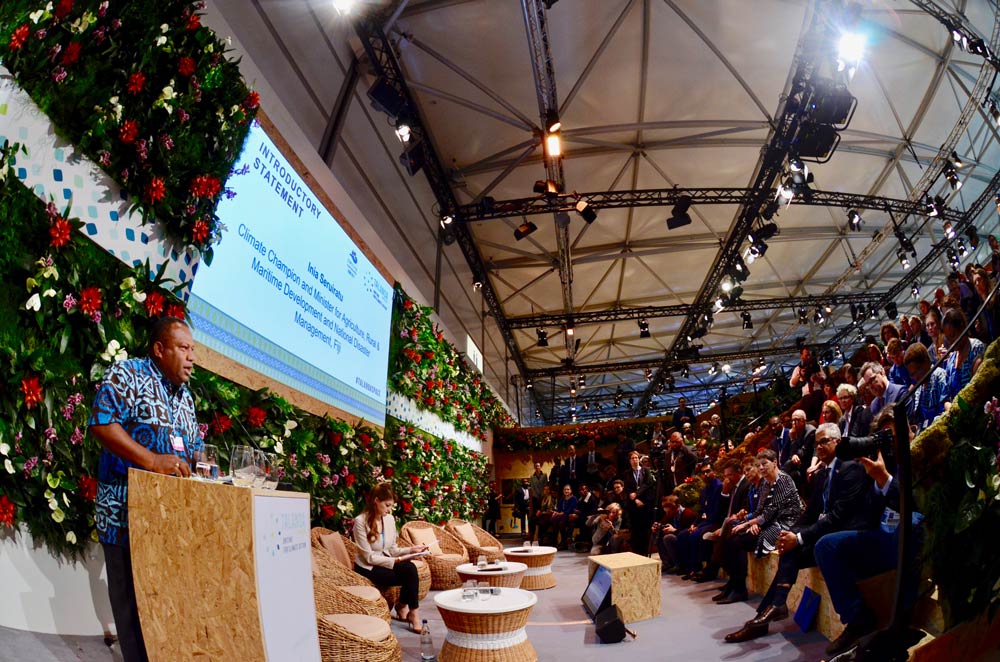
Inia Seruiratu, Fiji’s Minister for Agriculture, Rural & Maritime Development, and National Disaster Management. Photo Credits: Max Thabiso Edkins/Connect4Climate
Investing in Climate Action

 R20 and Blue Orchard Finance’s African Sub-national Climate Fund to provide ready-to-invest projects and funds to implement at least 100 infrastructure projects by 2020
R20 and Blue Orchard Finance’s African Sub-national Climate Fund to provide ready-to-invest projects and funds to implement at least 100 infrastructure projects by 2020Coordinating Climate Action
With so many climate action pledges and initiatives from across government, business and civil society, there is a growing need to coordinate effort to ensure that every cent invested and every minute of work contributed results in a much greater impact than each acting separately.

 SIDS Health Initiative by WHO, UN Climate Change secretariat and Fijian COP 23 Presidency to ensure small island developing states have health systems resilient to climate change by 2030
SIDS Health Initiative by WHO, UN Climate Change secretariat and Fijian COP 23 Presidency to ensure small island developing states have health systems resilient to climate change by 2030
 America’s Pledge brings together private and public sector leaders to ensure the US remains a global leader in reducing emissions and delivers the country’s climate goals under the Paris Agreement
America’s Pledge brings together private and public sector leaders to ensure the US remains a global leader in reducing emissions and delivers the country’s climate goals under the Paris Agreement
 Powering Past Coal Alliance brings together 25 countries, states and regions to accelerate the rapid phase-out of coal and support affected workers and communities to make the transition
Powering Past Coal Alliance brings together 25 countries, states and regions to accelerate the rapid phase-out of coal and support affected workers and communities to make the transition
 C40 mayors of 25 pioneering cities, representing 150 million citizens, pledged to develop and begin implementing more ambitious climate action plans before the end of 2020 to deliver emissions neutral and climate resilient cities by 2050
C40 mayors of 25 pioneering cities, representing 150 million citizens, pledged to develop and begin implementing more ambitious climate action plans before the end of 2020 to deliver emissions neutral and climate resilient cities by 2050
 Global Alliance for Buildings and Construction – signed agreement to dramatically speed up and scale up collaborative action
Global Alliance for Buildings and Construction – signed agreement to dramatically speed up and scale up collaborative action
 below50 -World Business Council on Sustainable Development initiative to grow the global market for the most sustainable fuels.
below50 -World Business Council on Sustainable Development initiative to grow the global market for the most sustainable fuels.
 Transforming Urban Mobility Initiative - Accelerating implementation of sustainable urban transport development and mitigation of climate change.
Transforming Urban Mobility Initiative - Accelerating implementation of sustainable urban transport development and mitigation of climate change.
 The Ocean Pathway Partnership aims, by 2020, to strengthen action and funding that links climate change action; healthy oceans and livelihoods including through the UN Climate Change process and via national climate action plans
The Ocean Pathway Partnership aims, by 2020, to strengthen action and funding that links climate change action; healthy oceans and livelihoods including through the UN Climate Change process and via national climate action plans
 United Nations Development Programme launched the Global Platform for the New York Declaration on Forests to accelerate achievement of its goals of forest protection and restoration.
United Nations Development Programme launched the Global Platform for the New York Declaration on Forests to accelerate achievement of its goals of forest protection and restoration.Corporate Emission Cuts

 EV100 – More big companies join transition to electro-mobility
EV100 – More big companies join transition to electro-mobilityGovernment Ratifications

 Six countries have ratified the Doha Amendment (Belgium, Finland, Germany, Slovakia, Spain, and Sweden) – 90 countries in total have ratified
Six countries have ratified the Doha Amendment (Belgium, Finland, Germany, Slovakia, Spain, and Sweden) – 90 countries in total have ratified
 Eight countries have ratified the Kigali Amendment to the Montreal Protocol (Comoros, Finland, Germany, Lao People's Democratic Republic, Luxembourg, Maldives, Slovakia and the UK) – 19 countries in total have ratified
Eight countries have ratified the Kigali Amendment to the Montreal Protocol (Comoros, Finland, Germany, Lao People's Democratic Republic, Luxembourg, Maldives, Slovakia and the UK) – 19 countries in total have ratified
Related News
|
Inspired Ideas for Purer Air
By

We may have to wait years for polluting vehicles to be scrapped, so tech that helps clean the air, especially in our cities, is a good investment. Here are six innovative ideas to help us breathe better.
A little-known UK-based company, Vivex Engineering, has developed a Modular City Air Cleaner (MCAC) inspired by the atmosphere purifying effects of rain and thunderstorms.
The firm, which makes cold plasma air purification systems for factories, designed a solution that sucks air through a high-voltage high-frequency electric field. The electric field produces lightning-like electrical discharges, ionizing the air inside the module. The lightning changes the chemical composition of pollutants present in the air and aggregates small particles into larger clusters. A stream of water subsequently washes away pollutants, just like in a summer rainstorm. The technology also kills bacteria and viruses present in the air.
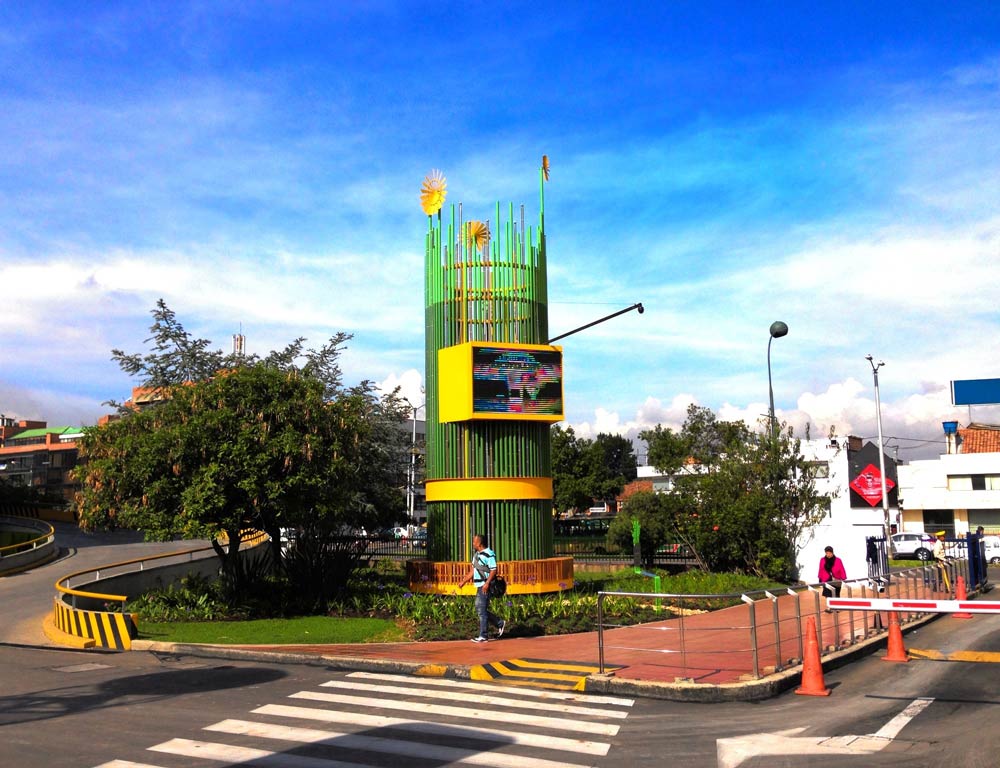
Vivex Engineering says one standard MCAC unit clears the air within a 25m-high column with an 80-metre radius. Purifying one cubic metre of air requires approximately a tenth of a watt of electrical power.
The environmentally friendly technology could be enhanced by integrating a solar panel into units exposed to direct sunlight. In tests, the technology removed 50 per cent of dust particles on average and 55 per cent of nitrogen oxides in just one step.
About the author:
Tereza Pultarova is a science journalist and health freak on a journey to better health, immortality and better youth using holistic approaches to a lifestyle based on some cutting-edge science that is unfortunately still on the fridges. We do have more power over our health and well-being than we think and I am on a mission to spread the message. And along the way, we shall also make sustainable choices to keep our planet healthy as well.




